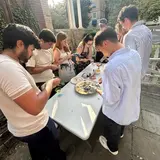
Competing to Shape the Future of Clean Energy
A student-run case competition allowed Arjun Kumar ’25 and his teammates to showcase analytical and problem-solving skills and network with leaders in the energy industry.
The Rice University Cleantech Innovation Conference (RCIC) is a student-led case competition that welcomes future clean tech and energy leaders from communities across the U.S. to discuss solutions to a pressing issue: the increasing energy demand in this country. RCIC offers a platform for students and industry professionals to learn from each other and discuss the challenges and opportunities presented by decarbonization. It’s also a great professional development opportunity, allowing students to engage with real-world problems and provide impactful solutions that showcase critical analytical and problem-solving skills within a short period of time.
This year, I traveled to Texas to compete in the competition, participate in networking events with industry leaders, and attend the Rice Energy Finance Summit, a partner event. The case competition began in early fall as teams across the country raced to develop and submit a pitch deck to this year’s case challenge. Our team was one of five finalists invited to pitch proposals in person to judges at Rice University. The judges ranged from investors to academics to industry professionals. The winning teams were announced during the summit, recognized for their achievements, and awarded cash prizes ranging from $2,500 to $10,000.
Our team, the Yale Grid Kids, included Monica Gronseth ’27 and Spencer Burget ’27, who are joint-degree students at SOM and the Yale School of the Environment, and Alex Dial ’25. We developed a novel software and hardware solution that created a valuable use case for curtailed renewable energy, as well as technology to meet the charging needs of electrified freight trucks. Our proposed pitch included two innovative energy products that, when developed together, could unlock new value streams for utilities, freight trucking companies, renewable energy generators, and commercial customers. We drew from our backgrounds in energy, technology, and finance to develop a product, business plan, and financial model. We were ecstatic to finish as runners-up in the competition, placing second out of five finalists chosen from 34 teams representing MBA programs across the country.
It was a special experience collaborating with my classmates and applying our Yale coursework and diverse professional backgrounds to a tough but ultimately rewarding case challenge. We were forced to think like startup founders and develop a deep understanding of product-market fit, financial viability, and the true value that our ideas could generate. Ultimately, we were proud of our efforts and achievements and certainly had fun along the way. Go Bulldogs!
Read more about the competition on the Yale Center for Business and the Environment website.



